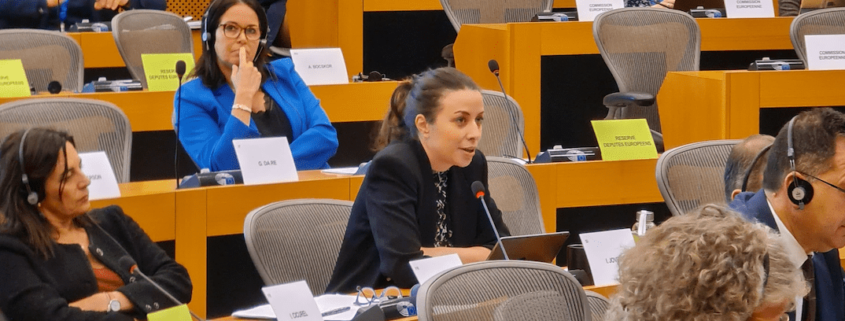On Tuesday, 28 March 2023, MEP Irena Joveva attended the meeting of the European Parliament’s Committee on Culture and Education and its first exchange of views on the European Media Freedom Act, which will establish a common framework for media services in the Union’s internal market. “No one need fear media legislation … except those who are eager to see media freedom restricted and abused,” she made clear.
Joveva began by pointing out that media freedom is of paramount importance for our democracy and that it is an area that has too often been neglected in the Union’s rule of law toolbox.
“We can now clearly see that it is easier to defend existing freedom than to restore it once it has been demolished.”
Joveva supported her view by pointing out that what happens in one Member State has an impact on others and ultimately on the whole Union, including the single market. She noted that the Regulation proposes some common basic principles—such as the rights of media service recipients and providers—which she believes should be fully endorsed to ensure their direct application throughout the Union. The act should, above all, provide legal remedies for journalists, citizens and media service providers to protect various rights, she added.
“The most important thing I would like to stress is that no one should fear this European level media legislation—with the exception of those who are eager to restrict media freedom or abuse the media for their own or partial interests.”
In her view, the Regulation introduces a soft but encouraging push towards communication between national regulators to boost cooperation within the EU, thereby increasing public access to key information and creating safeguards within the Union; safeguards which ought not to be needed in an ideal world, but the reality is simply otherwise. The Act foresees the creation of a European Board for Media Services, which Joveva believes should not only be truly independent, but also have the discretion to give opinions on various topics.
“Transparency is one of the key parts of the Act, as it touches on ownership, state funding and advertising, which I would wish to see extended to all state actors, including state-owned companies. The fact is that there already are extremely large concentrations in Union markets, and these can have important political connotations. Thus, any potential merger or takeover in the media sector should be carefully and publicly scrutinised, while ensuring that the media provider has a sufficient degree of editorial independence, regardless of ownership.”
Joveva would furthermore equip the Board with even more expertise by including a wider range of participants, such as journalists’ associations, media representatives and media experts. As she pointed out, this is crucial for its functioning, as some national regulators lack expert support, and in some cases their staff are politically selected.
She also touched on Article 17, which has stirred up some controversy in terms of striking a balance. Joveva sees a solution in the appropriate designation process, which should ensure unambiguity as to who deserves certain privileges, but would also ensure greater transparency. Joveva admitted that she was initially sceptical about media exemptions, but now believes that professional and reputable media deserve a special place in relation to online platforms, as these have an increasing influence on our lives and perception of the world.
“I would like to stress that it is the responsibility of all of us and all Member States to protect the fundamental values of our democracies, with media freedom at the very top.”
The MEP concluded her speech by expressing optimism that all further discussions on the Act will be fruitful and that cooperation between the rapporteurs on the Act will prove effective.





Leave a Reply
Want to join the discussion?Feel free to contribute!